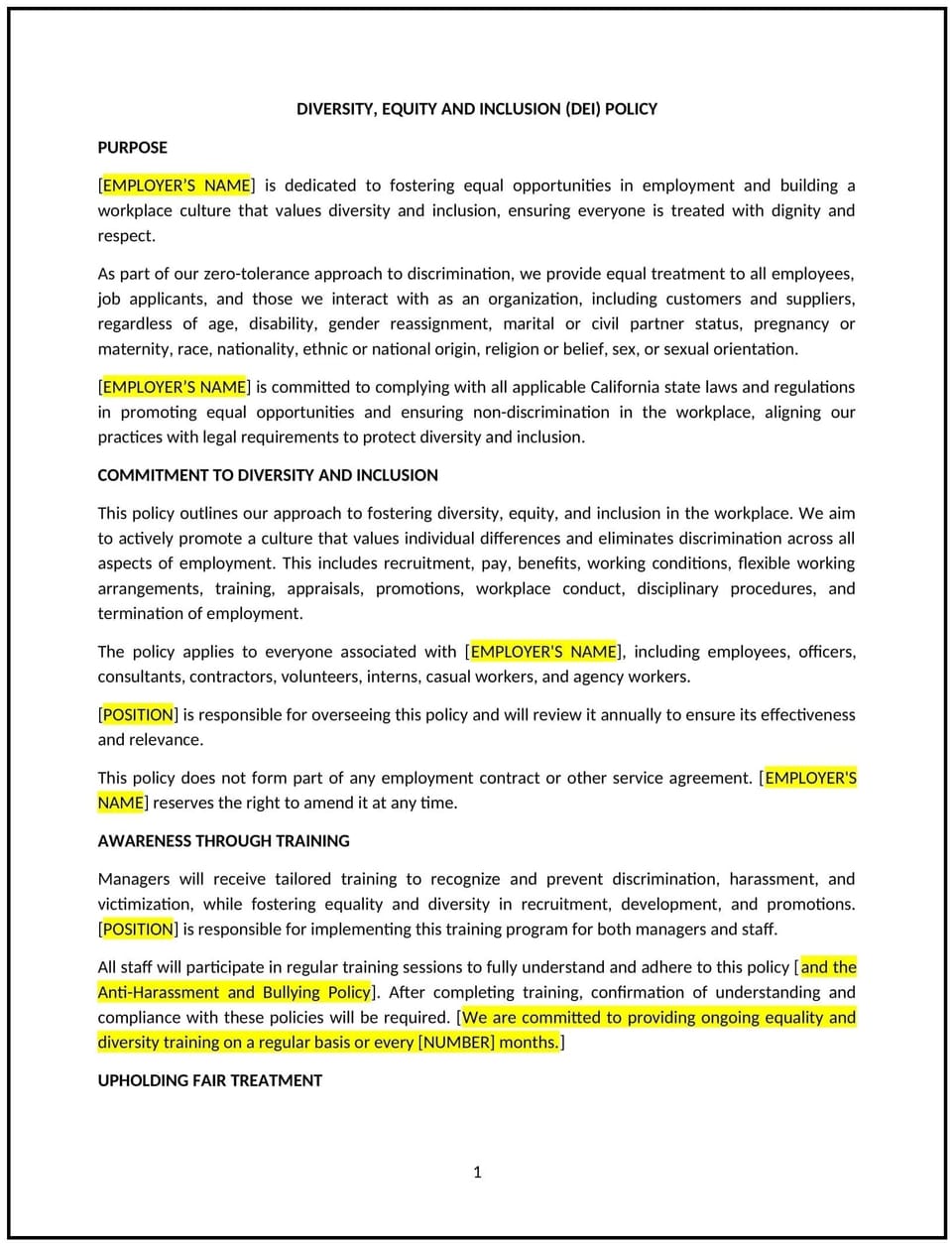Diversity, equity and inclusion (DEI) policy (California): Free template

Diversity, equity, and inclusion (DEI) policy (California)
In California, a diversity, equity, and inclusion (DEI) policy provides businesses with guidelines to create a workplace that values and respects individual differences while promoting fairness and equal opportunities. This policy helps businesses foster a culture of inclusion and supports compliance with California laws, such as the California Fair Employment and Housing Act (FEHA).
This policy outlines the business’s commitment to DEI, the actions it will take to promote inclusivity, and how employees can contribute to these efforts. By implementing this policy, California businesses can enhance employee engagement, attract diverse talent, and reduce risks of discrimination claims.
How to use this diversity, equity, and inclusion (DEI) policy (California)
- Communicate commitment: Clearly state the business’s dedication to creating an inclusive and equitable workplace.
- Define key principles: Outline what diversity, equity, and inclusion mean for the business and how they will be reflected in hiring, training, and workplace interactions.
- Set goals: Establish actionable goals for promoting DEI, such as increasing diverse representation or implementing training programs.
- Provide reporting channels: Encourage employees to report concerns related to discrimination or inequity, ensuring confidentiality and non-retaliation.
- Review and evaluate: Regularly assess DEI initiatives to measure progress and identify areas for improvement.
Benefits of using this diversity, equity, and inclusion (DEI) policy (California)
This policy offers several advantages for California businesses:
- Supports compliance: Reflects California anti-discrimination and equal opportunity laws, promoting lawful and fair workplace practices.
- Enhances recruitment: Attracts diverse talent by demonstrating the business’s commitment to equity and inclusion.
- Improves retention: Fosters a workplace where all employees feel valued and respected, boosting morale and loyalty.
- Encourages innovation: Leverages diverse perspectives to drive creativity and better decision-making.
- Mitigates risks: Reduces the likelihood of discrimination claims or workplace conflicts through proactive DEI measures.
Tips for using this diversity, equity, and inclusion (DEI) policy (California)
- Reflect California-specific laws: Incorporate requirements under FEHA and other state laws that protect against discrimination and promote equity.
- Train employees: Provide regular DEI training to increase awareness and understanding of inclusive workplace practices.
- Set measurable objectives: Use data to track progress on DEI goals, such as employee demographics or participation in DEI initiatives.
- Encourage feedback: Create channels for employees to share suggestions or concerns related to DEI efforts.
- Update regularly: Revise the policy to reflect changes in California laws, workforce demographics, or industry standards.
Q: How does this policy benefit the business?
A: This policy supports compliance with California laws, enhances employee engagement, and helps the business attract and retain diverse talent.
Q: What steps does the business take to promote DEI?
A: The business commits to inclusive hiring practices, providing DEI training, and fostering a workplace culture that values diversity and equity.
Q: How does this policy support compliance with California laws?
A: The policy reflects California anti-discrimination laws, supporting fair and equitable treatment of employees.
Q: What actions can employees take to contribute to DEI initiatives?
A: Employees can participate in DEI programs, provide feedback, and promote inclusivity in their day-to-day interactions.
Q: How can the business measure the success of its DEI efforts?
A: The business can track metrics such as workforce diversity, employee satisfaction, and participation in DEI initiatives to evaluate progress.
This article contains general legal information and does not contain legal advice. Cobrief is not a law firm or a substitute for an attorney or law firm. The law is complex and changes often. For legal advice, please ask a lawyer.


